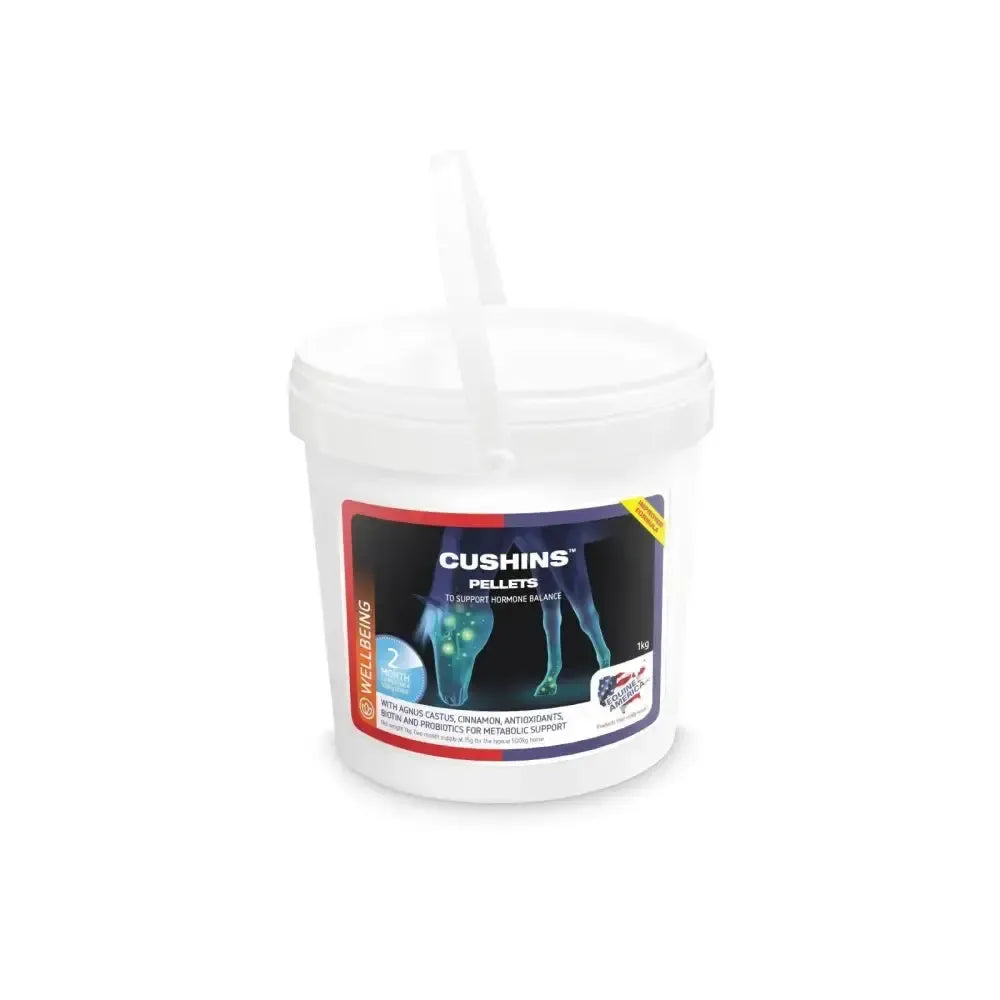Equine America Cushins Pellets 1kg
Couldn't load pickup availability
Additional payment methods
Your payment information is processed securely. We do not store credit card details nor have access to your credit card information.
Equine America Cushins Pellets 1kg
Providing nutritional support for the endocrine (hormone) system and pituitary gland in particular Providing nutritional support for insulin regulation Supporting hoof health with 20 mg biotin plus methionine Providing natural, plant-based antioxidants plus MSM Providing pre and probiotics to support a healthy gut microbiome Low sugar and starch formula About Key Ingredients per 30g Serving Agnus Castus 5g (Chastetree berries) Biotin 20mg Cinnamon 3g Methionine 300mg Magnesium 1g Folic Acid 100mg MSM 1g Probiotic yeast 8.3 x 1011cfu/kg What Are Cushins™ Pellets? Cushins pellets are formulated to provide significant nutritional support for the pituitary gland, insulin regulation, gut health and hoof health. Agnus Castus (Chastetree berry) is thought to promote support for the endocrine (hormone) system, and magnesium and cinnamon provide support for insulin regulation and control of blood sugar. Vitamin E and Rosehips provide significant antioxidant support to help with oxidative stress and immune support, and other key vitamins including Folic Acid and Vitamin B6 help to promote general health. A full 20 mg of biotin, together with MSM plus key amino acid methionine help to support hoof health . Natural prebiotics plus a live probiotic help to support gut health, and Ginseng helps to support an active outlook in older horses and ponies.
CushinsTM Pellets are suitable for all horses and ponies, and may be fed alone, or added to a small fibre feed. Which horses and ponies can get Cushings? Equine Cushing's Disease or Pituitary Pars Intermedia Dysfunction (PPID) is a disease of older horses and ponies, usually over 10 years old. Up to 30% of aged horses have Equine Cushings, and risk of the disease increases with age. Ponies seem to be more frequently affected than horses but this may be because they tend to live longer rather than them being at a greater risk and there doesn't seem to be a breed or sex bias. What is Cushings and what are the symptoms? PPID involves the pituitary gland, a gland located at the base of the brain that produces hormones. In those with PPID, the pituitary gland is enlarged, leading to an excessive production of hormones, such as ACTH. These hormones then affect the whole body. Signs of the disease include: Hairy curly coat (but in the early stages this may simply be noticed as slow to lose their winter coat) Laminitis. The majority of horses with laminitis will have an underlying hormonal cause: Cushings and/ or Equine Metabolic Syndrome (EMS) Loss of topline and pot-bellied appearance Abnormal fat deposits particularly above the eyes, the crest of the neck and above the tail head Increased drinking and urination Fatigue and poor performance Excessive sweating Recurring infections Reduced fertility Increased susceptibility to infections and internal parasites.
How to manage Cushings?
Cushings is diagnosed by a Vet, and a simple blood test. The most used screening test is a basal plasma ACTH blood test. Historically the ACTH blood test could only be taken at certain times of year as ACTH naturally increases in the Summer an Autumn due to the increased pituitary activity, but now following research, laboratories use seasonally adjusted reference ranges to allow for this variation. Horses may also be diagnosed with insulin dysregulation and Equine Metabolic Syndrome (EMS) at the same time. EMS and insulin dysregulation are mainly controlled by dietary management and a careful exercise programme under Veterinary guidance, although some will receive medication too. Unfortunately, there is no cure for Cushings but there is an effective treatment available, the prescription medication, Pergolide (Prascend). The good news is well managed horses and ponies with Equine Cushings can live a long and normal life. Horses and ponies with Cushings, will benefit from careful management including a review of their diet and targeted nutritional support, alongside exercise (as appropriate). Horses & ponies with excessive hair growth will benefit from regular clipping to help them remain comfortable. Horses with PPID are more likely to sweat more, so additional electrolytes (e.g. Apple Lytes) may need to be provided to ensure their losses are being replaced. Regular dental care and a review of their worming programme is also important. Nutritional management of Cushingoid horses and ponies is very similar to that of a laminitic and should focus on a diet that is high in fibre, low in starch & sugar and provides vital minerals and vitamins. Extra oil may be included for those who struggle to maintain condition. Natural nutritional support such as Equine America’s Cushins Pellets are formulated to help maintain a healthy endocrine system, including the pituitary gland.
What are the benefits of Cushins Pellets?
Agnus Castus (Chastetree berry) to provide support for the endocrine (hormone) system. Magnesium and cinnamon provide support for insulin regulation and control of blood sugar. Vitamin E, Rosehips and Melon Pulp provide significant antioxidant support to help with oxidative stress and immune support, and other key vitamins including Folic Acid and Vitamin B6 help to promote general health. Full 20 mg of biotin per serve, together with MSM plus the key amino acid methionine helps to support hoof health. Natural prebiotics plus a live probiotic help to support gut health, which in turn will help support a healthy immune system. Ginseng helps to support an active outlook in older horses and ponies. If you suspect your horse or pony may have Cushings, its always advisable to discuss this with your vet, who will help you to design the correct treatment and management plan for your individual horse or pony.
Product Specification
Product Specification
Delivery and Shipping
Delivery and Shipping
Shipping Options For This Product



